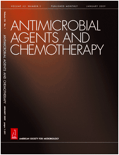
ANTIMICROBIAL AGENTS AND CHEMOTHERAPY
Scope & Guideline
Advancing the Frontiers of Antimicrobial Science
Introduction
Aims and Scopes
- Antimicrobial Resistance Mechanisms:
Research on the mechanisms by which bacteria and fungi develop resistance to various antimicrobial agents, including β-lactams, fluoroquinolones, and antifungals. - Clinical Pharmacokinetics and Pharmacodynamics:
Studies that analyze the pharmacokinetics and pharmacodynamics of antimicrobial agents, aiming to optimize dosing regimens and improve therapeutic outcomes. - Novel Antimicrobial Agents:
Development and evaluation of new antimicrobial compounds, including novel antibiotics, antivirals, and antifungals, targeting resistant pathogens. - In Vitro and In Vivo Efficacy Studies:
Evaluation of antimicrobial efficacy through laboratory and clinical studies, including animal models, to assess the effectiveness of new and existing therapies. - Epidemiological Surveillance:
Investigations into the epidemiology of infectious diseases, including the prevalence and spread of resistant strains in various populations. - Innovative Therapeutic Approaches:
Research on combination therapies, phage therapy, and other novel strategies to enhance the efficacy of existing antimicrobial treatments.
Trending and Emerging
- Antimicrobial Stewardship:
Growing focus on antimicrobial stewardship programs aimed at optimizing the use of antimicrobials to combat resistance and improve patient outcomes. - Phage Therapy:
Increased interest in bacteriophage therapy as a viable alternative or adjunct to antibiotics, particularly against multidrug-resistant bacteria. - Machine Learning and AI in Drug Development:
Application of machine learning and artificial intelligence techniques to predict antimicrobial efficacy, optimize dosing regimens, and identify novel drug candidates. - Global Surveillance of Resistance Patterns:
Enhanced efforts in global surveillance studies to track antimicrobial resistance patterns, particularly in response to the COVID-19 pandemic. - Pharmacogenomics:
Emerging research into pharmacogenomic factors affecting antimicrobial therapy, tailoring treatments based on individual genetic profiles. - Combination Therapy Approaches:
A trend towards exploring combination therapies that synergize multiple agents to enhance efficacy against resistant pathogens.
Declining or Waning
- Traditional Antibiotics:
Research focusing on the efficacy of traditional antibiotics has diminished as the field shifts towards exploring novel agents and combination therapies. - Single-Agent Studies:
There has been a noticeable reduction in studies investigating the effectiveness of single-agent treatments, as the focus moves towards combination therapies to combat resistance. - Non-Pharmacological Interventions:
Studies examining non-pharmacological interventions (e.g., infection control measures) in antimicrobial therapy have decreased, likely due to a greater emphasis on drug development. - Antifungal Resistance Mechanisms:
While antifungal resistance remains a concern, the volume of research specifically addressing resistance mechanisms has seen a relative decline compared to the surge in studies on bacterial resistance.
Similar Journals
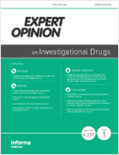
EXPERT OPINION ON INVESTIGATIONAL DRUGS
Transforming Insights into InnovationsExpert Opinion on Investigational Drugs, published by Taylor & Francis Ltd, is a premier journal dedicated to the dissemination of high-quality, peer-reviewed research in the fields of pharmacology and medicine. As an integral part of the scientific community since its inception in 1994, this journal has established itself as a leading source of insightful analysis and expert commentary on emerging drug therapies, providing invaluable resources for researchers, clinicians, and healthcare professionals. With an impressive impact factor and ranking in the top quartile across multiple pharmacological categories, it remains a vital platform for discussing innovative drug developments and their clinical applications. Though it operates on a subscription basis, Expert Opinion on Investigational Drugs is crucial for anyone involved in pharmacological research and the drug development process, positioning itself at the forefront of medical advancements and offering critical insights into the rapid evolution of investigational therapies.

Emerging Microbes & Infections
Pioneering discoveries in microbial health.Emerging Microbes & Infections is a premier open access journal, published by Taylor & Francis Ltd since 2012, dedicated to advancing the understanding of microbial infections and their implications in human health. With an impressive Q1 ranking across multiple categories—including Drug Discovery, Epidemiology, Immunology, and Infectious Diseases—this journal is at the forefront of research in the microbiological sciences. Covering a diverse range of topics, it serves as a vital resource for researchers, healthcare professionals, and students alike. The journal's commitment to open access ensures worldwide dissemination of cutting-edge findings, fostering collaboration and innovation in tackling challenges posed by emerging infections. As part of the thriving academic community in the United Kingdom, Emerging Microbes & Infections plays a crucial role in shaping the future of infectious disease research and public health.
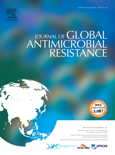
Journal of Global Antimicrobial Resistance
Exploring the forefront of antimicrobial resistance research.The Journal of Global Antimicrobial Resistance, published by Elsevier Scientific Ltd, is a premier open access journal dedicated to addressing the critical issue of antimicrobial resistance on a global scale. Established in 2013 and significantly gaining traction as an open access platform since 2020, this journal serves as an essential resource for researchers, healthcare professionals, and policy makers invested in immunology, microbiology, and associated fields. With an impressive impact factor reflected through its consistent ranking in the Q2 category across multiple disciplines, including Microbiology and Immunology – where it ranks #29 out of 140 in Medical Microbiology – the journal ensures high-quality peer-reviewed articles that push the boundaries of current knowledge and practice. By offering a global perspective on research trends and public health implications, the Journal of Global Antimicrobial Resistance plays a pivotal role in advancing the scientific discourse necessary to combat the rising tide of antimicrobial resistance worldwide.

Journal of Oral Microbiology
Empowering discoveries in the dynamic world of oral health.Journal of Oral Microbiology, published by Taylor & Francis Ltd, is a leading open-access journal that has been at the forefront of research since its inception in 2009. With an E-ISSN of 2000-2297, this journal is dedicated to advancing our understanding of oral microbiomes and their implications in various fields, including dentistry, infectious diseases, and medical microbiology. It proudly boasts a prestigious standing as Q1 in Dentistry (miscellaneous) and ranks within the top 20% in both Infectious Diseases and Medical Microbiology categories, as per Scopus rankings for 2023. Recognized for its high impact factor and contributions to groundbreaking research, the Journal of Oral Microbiology provides a vital platform for scholars, practitioners, and students striving to explore the dynamic interplay between oral health and microbial life. With open access since 2009, it encourages widespread dissemination and accessibility of knowledge that contributes to global health and innovation in dental research. Its commitment to excellence ensures that it remains an essential resource for anyone interested in the evolving landscape of oral microbiology.
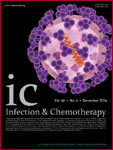
Infection and Chemotherapy
Leading the Charge in Antimicrobial ResearchInfection and Chemotherapy, an esteemed journal published by the Korean Society of Antimicrobial Therapy, focuses on the dynamic fields of infectious diseases and pharmacology. With an ISSN of 2093-2340 and an E-ISSN of 2092-6448, this peer-reviewed, open-access journal has been providing a crucial platform for research dissemination since 2008. Based in South Korea, it boasts a significant impact in the academic community, as evidenced by its Q2 ranking in both Infectious Diseases and Pharmacology categories for 2023. It holds a Scopus rank of 64 out of 272 in Pharmacology and 98 out of 344 in Infectious Diseases, showcasing its prominence and the quality of research it publishes. With a focus on advancing scientific knowledge, Infection and Chemotherapy is committed to fostering essential dialogues among researchers, clinicians, and students, making it a vital resource for those engaged in the fight against infectious diseases and the development of effective therapeutic protocols.

JOURNAL OF CHEMOTHERAPY
Advancing the Frontiers of Chemotherapy ResearchJournal of Chemotherapy is a distinguished peer-reviewed academic journal published by Taylor & Francis Ltd, focusing on the dynamic fields of infectious diseases, oncology, and pharmacology. With its ISSN 1120-009X and E-ISSN 1973-9478, this journal has been at the forefront of chemotherapy research since its inception in 1989 and continues to play a vital role in advancing medical science through rigorous studies and reviews. It currently holds a respectable position in various Scopus categories, ranked Q3 in several important disciplines, reflecting its commitment to providing quality research. Although it operates under a subscription model, Journal of Chemotherapy remains a crucial resource for practitioners and academics alike, facilitating knowledge exchange and innovation in the treatment of diseases through chemotherapy. With access to the latest findings and therapeutic advancements, this journal is a must-read for researchers, medical professionals, and students seeking to enhance their understanding of emerging trends in chemotherapy.

Reviews and Research in Medical Microbiology
Catalyzing Change in the Study of Infectious DiseasesReviews and Research in Medical Microbiology is a premier academic journal published by LIPPINCOTT WILLIAMS & WILKINS, focusing on groundbreaking research and comprehensive reviews that advance the understanding of medical microbiology. With an ISSN of 2770-3150 and an E-ISSN of 2770-3169, this journal serves as an essential resource for researchers, healthcare professionals, and students dedicated to the study of pathogens, infectious diseases, and microbial mechanisms affecting health. While the journal currently does not offer open access, its rigorous peer-review process ensures that only high-quality, impactful research is disseminated to the scientific community. The journal aims to bridge gaps in knowledge by presenting cutting-edge studies that explore novel therapeutic strategies, diagnostic methods, and the evolving landscape of microbial resistance. Nestled in the heart of Philadelphia, this journal proudly contributes to the advancement of medical microbiology and is an indispensable platform for the publication of critical findings that shape clinical practices and research trajectories in the field.
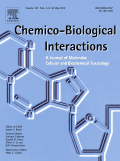
CHEMICO-BIOLOGICAL INTERACTIONS
Exploring the Nexus of Chemistry and BiologyCHEMICO-BIOLOGICAL INTERACTIONS is a premier journal published by Elsevier Ireland Ltd, dedicated to advancing the field of chemical and biological interactions since its inception in 1969. With a robust focus on pharmacology and toxicology, the journal holds a prestigious Q1 ranking in both Medicine (miscellaneous) and Toxicology, reflecting its significance in disseminating influential research. As part of the Scopus database, it ranks #21 out of 133 journals in Toxicology, positioning it in the 84th percentile and ensuring high visibility for cutting-edge studies. This scholarly platform serves as a crucial resource for researchers, professionals, and students who seek reliable and innovative findings at the intersection of chemistry and biology. While currently not open access, CHEMICO-BIOLOGICAL INTERACTIONS provides a comprehensive collection of articles that contribute to the ongoing dialogue in toxin research and its implications on medicinal chemistry, thereby fostering advancements in public health and safety.
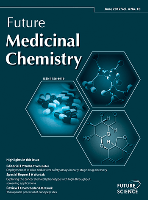
Future Medicinal Chemistry
Exploring innovative solutions in medicinal chemistry.Future Medicinal Chemistry is a premier journal dedicated to the rapidly evolving fields of drug discovery, pharmacology, and molecular medicine. Published by Newlands Press Ltd in the United Kingdom, this journal has garnered significant attention within the academic community, evidenced by its 2023 category rankings in Scopus, placing it in the Q2 quartile for Drug Discovery and the Q3 quartiles for both Molecular Medicine and Pharmacology. With an ISSN of 1756-8919 and an E-ISSN of 1756-8927, Future Medicinal Chemistry has been a cornerstone of scholarly discourse since its inception in 2009, continuously contributing to the advancement of knowledge and discussion in medicinal chemistry. The journal is committed to publishing high-quality, peer-reviewed research that addresses the challenges and innovations in drug development and therapeutic strategies, making it an essential resource for researchers, professionals, and students seeking to stay at the forefront of these critical fields. Engage with the latest findings and methodologies that shape the future of medicine by exploring the wealth of information offered within Future Medicinal Chemistry.
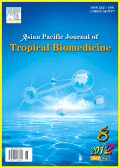
Asian Pacific Journal of Tropical Biomedicine
Exploring the Frontiers of Biomedicine in the Tropics.The Asian Pacific Journal of Tropical Biomedicine, published by Wolters Kluwer Medknow Publications, is a premier open-access journal dedicated to advancing research in the fields of tropical biomedicine. Launched in 2011 and fully embracing the open-access model since 2014, this journal has become an invaluable resource for researchers, professionals, and students alike. With an impact factor reflective of its Q3 ranking in the category of Biochemistry, Genetics and Molecular Biology (miscellaneous), it currently holds a Scopus rank of #49 out of 103, placing it in the 52nd percentile in its field. Covering diverse topics on biomedicine, the journal aims to disseminate significant findings and foster collaborative research initiatives across the Asian Pacific region and beyond. With its robust commitment to accessibility and quality, the Asian Pacific Journal of Tropical Biomedicine is a vital platform for promoting scientific knowledge and innovation.